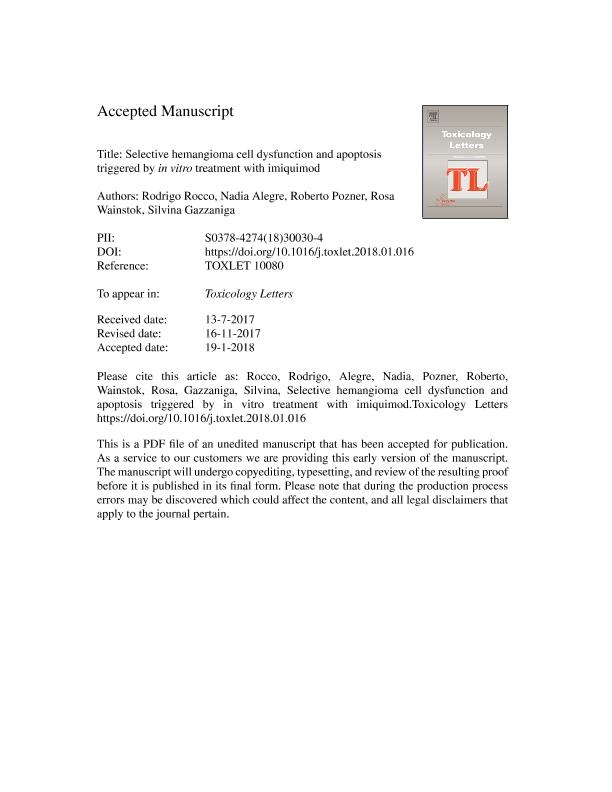Artículo
Selective hemangioma cell dysfunction and apoptosis triggered by in vitro treatment with imiquimod
Fecha de publicación:
05/2018
Editorial:
Elsevier Ireland
Revista:
Toxicology Letters
ISSN:
0378-4274
Idioma:
Inglés
Tipo de recurso:
Artículo publicado
Clasificación temática:
Resumen
Infantile hemangiomas are the most common benign tumors of infancy, characterized by unregulated angiogenesis and endothelial cells with high mitotic rate. Although spontaneous regression occurs, sometimes treatment is required and alternatives to corticosteroids should be considered to reduce side effects. Imiquimod is an imidazoquinoline, approved for some skin pathologies other than hemangioma. It is proposed that the effectiveness of imiquimod comes from the activation of immune cells at tumor microenvironment. However, the possibility to selectively kill different cell types and to directly impede angiogenesis has been scarcely explored in vitro for endothelial cells. In this work we showed a dramatic cytotoxicity on hemangioma cell, with a significant lower IC50 value in hemangioma compared to normal endothelial cells and melanoma (employed as a non-endothelial tumor cell line). Nuclear morphometric and flow-cytometry assays revealed imiquimod-induced apoptosis on hemangioma and melanoma cells but a small percentage of senescence on normal endothelial cells. At sub-lethal conditions, cell migration, a key step in angiogenesis turned out to be inhibited in a tumor-selective manner along with actin cytoskeleton disorganization on hemangioma cells. Altogether, these findings pointed out the selective cytotoxic effects of imiquimod on transformed endothelial cells, evidencing the potential for imiquimod to be a therapeutic alternative to reduce extensive superficial hemangioma lesions.
Palabras clave:
CYTOTOXICITY
,
ENDOTHELIUM
,
HEMANGIOMA
,
IMIQUIMOD
Archivos asociados
Licencia
Identificadores
Colecciones
Articulos(IMEX)
Articulos de INST.DE MEDICINA EXPERIMENTAL
Articulos de INST.DE MEDICINA EXPERIMENTAL
Articulos(IQUIBICEN)
Articulos de INSTITUTO DE QUIMICA BIOLOGICA DE LA FACULTAD DE CS. EXACTAS Y NATURALES
Articulos de INSTITUTO DE QUIMICA BIOLOGICA DE LA FACULTAD DE CS. EXACTAS Y NATURALES
Articulos(OCA CIUDAD UNIVERSITARIA)
Articulos de OFICINA DE COORDINACION ADMINISTRATIVA CIUDAD UNIVERSITARIA
Articulos de OFICINA DE COORDINACION ADMINISTRATIVA CIUDAD UNIVERSITARIA
Citación
Rocco, Rodrigo; Alegre, Nadia; Pozner, Roberto Gabriel; Wainstok, Rosa; Gazzaniga, Silvina Noemí; Selective hemangioma cell dysfunction and apoptosis triggered by in vitro treatment with imiquimod; Elsevier Ireland; Toxicology Letters; 288; 5-2018; 82-88
Compartir
Altmétricas




